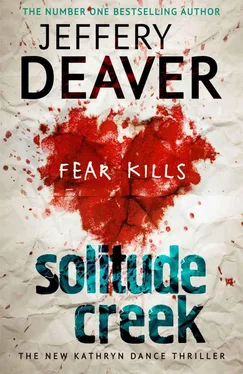‘Stuff.’ She disappeared into the den.
What was going on? Was it really nerves about the talent show? ‘Let It Go’ was a challenging tune, yes, but within Maggie’s range. Lord knew she’d rehearsed plenty despite the deception the other night about not knowing the lyrics.
Was it something else? It was approaching that time in her life when hormones would soon be working their difficult changes in her body. Maybe they already were.
Adolescence. Wes was already going through it.
Heaven help us...
Or was it what she’d discussed with O’Neil? Her father’s death.
But Maggie had seemed uninterested in talking about the subject. Dance had noted no unusual emotional affect patterns or kinesic messages when the subject of Bill came up. Still, kinesics is an imperfect science and, while Dance was talented when conversing with those she didn’t know, witnesses and suspects, her skills sometimes failed her when it came to family and friends.
She now trailed her daughter into the den and sat down on the couch. ‘Hey, babes. How’s it going?’
‘Yeah. Okay.’ Maggie was instantly suspicious.
‘You’ve been kind of moody lately. Anything you want to talk about?’
‘I’m not moody.’ She flipped through one of the Harry Potter books.
‘How’s “distracted”?’ Dance smiled.
‘Everything’s fine.’
Thinking of the other children’s movie song, ‘Everything Is Awesome’, which Michael O’Neil had threatened playfully to sing. Just like in that movie, where everything wasn’t so awesome, Maggie wasn’t fine.
She tried once or twice more to get her daughter to engage but she’d learned that it was impossible to do so if the children refused. The best solution was to wait for a different time.
Dance concluded with the standard, ‘If there’s anything you want to talk about, anything at all, let me know. Or I’ll turn into a monster. You know what kind of monster I can be. Mom Monster. And how scary is that ?’
Her smile was not reciprocated but Maggie tolerated the kiss on the head. Then Dance rose and stepped out onto the Deck, where Boling sat beneath the propane heater.
They spoke about the case — to the extent she felt comfortable — then about some of his projects, new code he was writing, the reasons why his college-level students hadn’t finished their assignments.
‘I wish I could give them a grade for the best excuse. I mean, there were A-pluses there.’
Dance glanced down at the end of the Deck, where Wes and two friends were intensely involved in a game. She recognized Donnie. She’d seen the other boy but couldn’t come up with the name.
She whispered to Boling, ‘And that’s...’
‘Nathan.’
‘Right.’
He was taller than the others, stocky. The first time he’d been there he’d walked in with a stocking cap. Dance had started to say something, when Donnie noticed and, eyes wide, said, ‘Dude? Seriously? Respect.’
‘Oh, sorry.’ The hat had vanished and he’d never worn it again.
The boys were now on the back deck playing the game they’d made up themselves. Its name was, she believed, Defend and Respond Expedition Service, or something similar. She supposed there was some shoot-’em side to it but that didn’t bother her. Since it was played with paper and pen, a variation of a board game, she didn’t mind a little military action. Dance kept her eye on video games and movies. TV shows now too. Cable opened the door to anything-goes. Wes had asked if he and Donnie could watch Breaking Bad . Dance had screened it first and loved the show but after the acid-dissolved body fell through a ceiling, she’d decided: No. Not for a few years.
But a game you played with paper and pen? How harmful could that be?
‘You boys want to stay for dinner? Call your parents?’
Donnie said, ‘Thanks, Mrs Dance, but I have to go home.’
‘Yeah, me too,’ Nathan said, looking embarrassed and guilty at the same time — the essential expressions of adolescence.
‘Start packing up. We’re going to eat soon.’
‘Okay,’ Donnie said.
She looked at her son and, when she spoke, she quashed ‘honey’, given that his peers were present. ‘Wes, Jon and I were talking. You ever see Rashiv any more?’
Silence for a moment. ‘Rashiv?’
‘He was nice. I haven’t seen him for a while.’
‘I don’t know. He’s kind of... He’s got a different bunch he hangs with.’
Dance thought this was too bad. The Indian American was, as Jon Boling had observed, funny and smart and polite. Which meant not only was he good company but he was a good influence too. Her son was getting to the point where, in the middle school he attended, there would be increasing temptations to steer toward the dark side. ‘Well, if you see him, say hi for me.’
‘Sure.’
After Wes’s friends had left, Dance herded Maggie from the den and the two ladies prepared dinner. Whole Foods had been instrumental — sushi, a roast chicken, mashed potatoes, green beans and a complicated salad, which included cranberries, some kind of mystery seed, bits of cheese and impressive croûtons.
Boling set the table.
As she watched him her thoughts segued to the two of them, Dance and Boling.
The hours he spent with her and the children were pure comfort. The times she and he got away alone for a rare night at an inn were so very fine too. (He never stayed the night when the children were here.) All was good.
But Kathryn Dance wasn’t long a widow. She monitored the pulse of her figurative heart, on the lookout for subconscious blips that might sabotage the relationship — the first since Bill’s death. She was not going to make fast decisions, for her own peace of mind, and the children: they were the north star by which she and Boling navigated their relationship. And it was Dance’s job to be in control. To keep the speed brakes on.
Then her hand, holding a large spoon, paused as it scooped mashed potatoes from carton to bowl. And she asked herself: Or is there another reason I’m keeping things with Jon Boling slow?
He looked up from the table and caught her eye. He smiled. She sent one his way too.
‘Dinner’s ready!’ she called.
Wes joined them, pulling a juice from the fridge.
‘Put the phone away. No texting.’
‘Mom, just—’
‘Now. And how can you text and open a Tropicana?’
He mumbled but his eyes grew wide when he saw the potatoes. ‘Awesome.’
As they sat down, Maggie said, ‘Are we going to say grace?’
This was new. The Dance household was not particularly religious.
‘We can if you’d like to. What do you want to say thanks for?’
‘Thanks?’
‘Grace is where you say thanks to God for something.’
‘Oh,’ Maggie said. ‘I thought it was where you asked for something.’
‘Not grace,’ Boling explained. ‘You can pray for things but grace is where you thank somebody else.’
‘What did you want to ask for?’ Dance looked at her daughter’s face, which revealed no emotion.
‘Nothing. I was just wondering. Can have I the butter, please?’
Chapter 26
Antioch March walked into a restaurant on Fisherman’s Wharf and got a table near the window.
Tourism on steroids. Nothing like the days of Steinbeck’s Cannery Row , he guessed.
He ordered a pineapple juice and looked at his prepaid once again. Nothing on the information he was expecting.
March ordered a calamari steak with steamed vegetables.
‘Sorry, they’re only sautéed. I don’t think the chef—’
‘That’s okay. I’ll take them that way.’
Another sip of juice. He opened his gym bag and began looking over maps and notes — what was planned for tomorrow. The theater had been denied him, set him back a day, but this would be just as good. Even better, he now reflected.
Читать дальше












